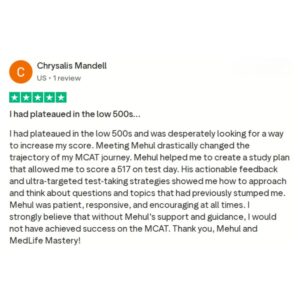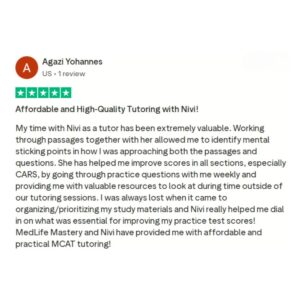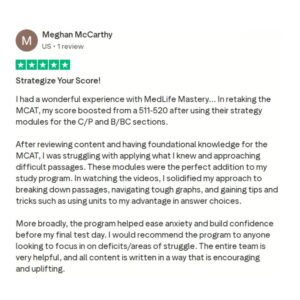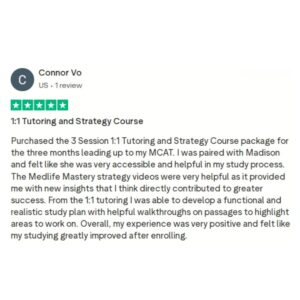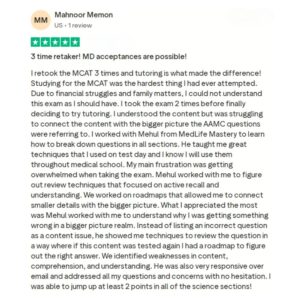Memory questions make up 25% of science questions on the MCAT.
But that's not a problem right? All those science heavy classes in your undergrad years have made you quite impressive at memorization...
At least that's what you thought before you came across the big fat monster of an exam that is the MCAT!
The sheer volume of rules, equations, and concepts that we need to memorize for the MCAT still blows our minds.
Not only do you have to memorize it all, but also apply it all to unfamiliar situations. Which means drilling it all into your mind and knowing everything like the back of your hand come exam day.
So it makes sense if you're feeling overwhelmed, fearful, or nervous as you're studying for the MCAT - we'd be too!
But worry not future doctor, we have your back!
If you're struggling with consistently getting the right answer and the scores you're aiming for, memorization might just be your main problem.
We wrote this detailed article with some of the best ways top-scorers force themselves to deeply understand and remember all they need to know...
To destroy the MCAT once and for all.
Ready? Let's begin...
More...
How Top Scorers Perceive The Art of MCAT Memorization
In order to instantly recall everything you need when you need it, you need to ensure the material gets absorbed and stays in your long term memory...
And that requires that you not only read but also understand the material.
Everything we're about to cover is to get you to understand the material easily and quickly.
Why is this important?
Here's the MCAT studying process of the average premed...
Study study study, do practice exam, get answers wrong, go back to review concepts, re-learn it all and try to commit it all to memory again...
This isn't wrong - you'll do this too - but with each and every concept you're returning to, to review again, you're wasting more time...
All the little things needed to review add up and together, wastes A LOT of time you could be using for more important things.
A lot of things aren't within your control when it comes to saving time but this is within your control. You can avoid this simply by properly understanding what you read the first time.
Being able to deeply understand something the first time you read it, means you don't ever have to spend much time on it again. That means you're SAVING time.
This is what top MCAT scorers know and keep at the back of their mind while studying and trying to master all the sciences.
Top scorers know that each time you don't have to revisit a concept, you can spend that time focused on strengthening your ability to apply your knowledge in passages (that's what REALLY matters).
How Top Scorers Think About The Concepts They Want To Remember and Understand
The reality is that most pre-meds tell themselves to focus when reading a textbook or while in a lecture. It doesn’t work.
We’ve all done it – ordering ourselves to focus, which is essentially trying to control what you think about.
Thoughts can’t be controlled that easily.
Our main motive when we try to control our thoughts and tell ourselves to focus, is to remember what we’re reading or listening to...
Majority of students start taking non-stop notes in hopes that the note-taking will help them remember it.
But top scorers know that the way we UNDERSTAND effectively and absorb information most efficiently, is not by transcribing notes word-to-word...
It’s by the way you think about the ideas you want to remember.
It's how you play with it in your mind.
The more you think about something in different ways, the deeper it will drill itself into your mind for you to pull up whenever it is needed.
Sounds simple, but there are creative strategies to get yourself to think about MCAT related concepts and theories in unique but effective ways.
One of the most powerful strategies is using 'orienting tasks'.
Using Orienting Tasks To Learn Like A Top Scorer
The evidence of the effectiveness of orienting tasks stems from a classic study done in 1969 by Thomas Hyde and James Jenkins.
In the study, there were two groups plus one control group.
Each group was told to read a list of words and they were quizzed on those words after.
Each group was given a different orienting task to process the words; group one was told to give attention to whether each word had the letter ‘e’ in it or not and group two was told to give attention to whether each word was pleasant or not.
After the quiz finished, the second group scored double that of the first group.
The second group scored higher because thinking about the pleasantness of the words forced them to think about the words on a much more effective level, than just looking at their semantics.
When focusing on the pleasantness, it forced them to think about the meaning.
They also tested for motivation – it didn’t matter how motivated students were to remember information, those with good orienting tasks remembered more.
Most premeds are extremely motivated (almost too motivated) to commit their material to memory... yet none of that matters.
That's why we love to say that it doesn't matter how hard you study, the only way to get a competitive score is by studying smart.
After understanding the idea of orienting tasks, we noticed a lot of inefficient studying habits premeds were applying, while thinking those habits were actually useful.
For example, what do most pre-meds do while reading? They highlight. We’re here to tell you that highlighting is generally not the most efficient way to study because MOST of the time, when you’re highlighting, you’re only thinking about the bolded words and the sentences that pop out at you.
Instead, what you should be thinking about is MEANING and CONNECTIONS between concepts. We’re not saying don’t highlight, but be mindful of how you’re thinking about what you’re highlighting.
A more effective orienting task would be to ask yourself questions because that will force you to think about what you’re reading, in a way that is in line with how you could be tested.
Another effective orienting task is to try and paraphrase what you just read and what you want to remember. In order to paraphrase, you have to think about the concept and play around with it in your mind, before you can properly articulate it.
Top Scorers Value Quality Over Quantity During MCAT Study
When studying for the MCAT, your main priority should be to enhance the quality of the time you’re sitting in a video lecture or in front of the book.
Most pre-meds focus on improving the quantity of time they spend in front of books, with the assumption that spending more time reading, means they’re getting more done and learning more.
The way to enhance the quality of the time you’re spending, is by taking on the mindset that your aim is to be mentally engaged with the content, as opposed to your aim being to read a certain number of pages or write out a certain amount of notes.
Don't make the wrong goals.
Your aim needs to be to think about what is being said. That’s the key. How are you making yourself think about what you’re reading or listening to in the lecture?
Note-taking will serve you very well, WHEN your aim is to make connections.
You need to ask yourself how you can take certain actions that will allow you to make connections between what the lecturer is saying and what you’ve read before or what you’ve experienced in life?
One key mental hack of a top MCAT scorer is to forbid yourself from copying and writing down everything word-for-word. From this point on, everything you write down should be in your own words!
Don't worry, it gets easier to do this with practice.
As you can see, our main focus in this post is on leveraging orienting tasks during your MCAT study.
They're powerful tools and if you keep them by your side during MCAT study, you will achieve a competitive MCAT score (especially because no one else will be preparing with key techniques like these to know the material inside out).
Here's a list of orienting tasks that top MCAT scorers leverage to enable themselves to think about concepts and terms in ways that force them to understand the material the FIRST time they go through it.
List of Some Orienting Tasks MCAT Masters Leverage
Your action steps: Write this list down in your notebook that you use during MCAT study. Ask yourself which ones you would you like to do? Which ones would you enjoy doing? Which ones do you already do?
You don't have to do them all - but do as many as you can. It WILL benefit you.
And don't worry about how long it takes because it will be worth it when you don't have to return to things all over again because you're getting them wrong on the practice exams.
Final Thoughts: How Top MCAT Scorers Look At The Big Picture and Ignore The Small Stuff
Remember to ease up on yourself about the MCAT.
When you get to med-school, you’ll realize that you can’t possibly know everything! It’s not possible to know every bit of information about a topic that could show up on an exam.
Although there are definitely pieces of information that are important and are very likely to show up. For example, it’s almost guaranteed that you’ll get a question on electrostatics and magnetism on the MCAT.
Don’t worry about the small stuff too much, and spend more of your time understanding things you know are super important – that’s a skill that you’ll need for exams in med-school as well.
(Hint: If it's not clear already, at MCAT Mastery, we're already preparing you for med-school because THAT's how confident we are that our top strategies will lead you to a competitive MCAT score which will open doors to your doctor future... ;))
Before beginning to study next time, think of how you’re not just studying for a grade on a test, but instead you’re gaining new skills in learning, that will serve you extremely well in med-school.
Remember, it's about studying smart not hard. Picture yourself in med-school, thanking your current self for studying effectively for the MCAT!
Let that bring a smile on your face…
Now you’re in the right mindset to succeed.
You got this,
The MedLife Mastery Team
Your MCAT Success Mentors
Sources of Reference:


 To help you achieve your goal MCAT score, we take turns hosting these
To help you achieve your goal MCAT score, we take turns hosting these 

